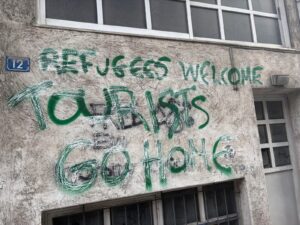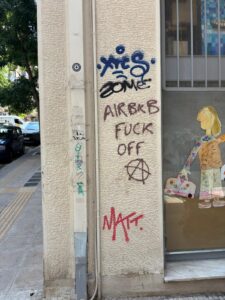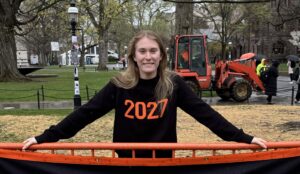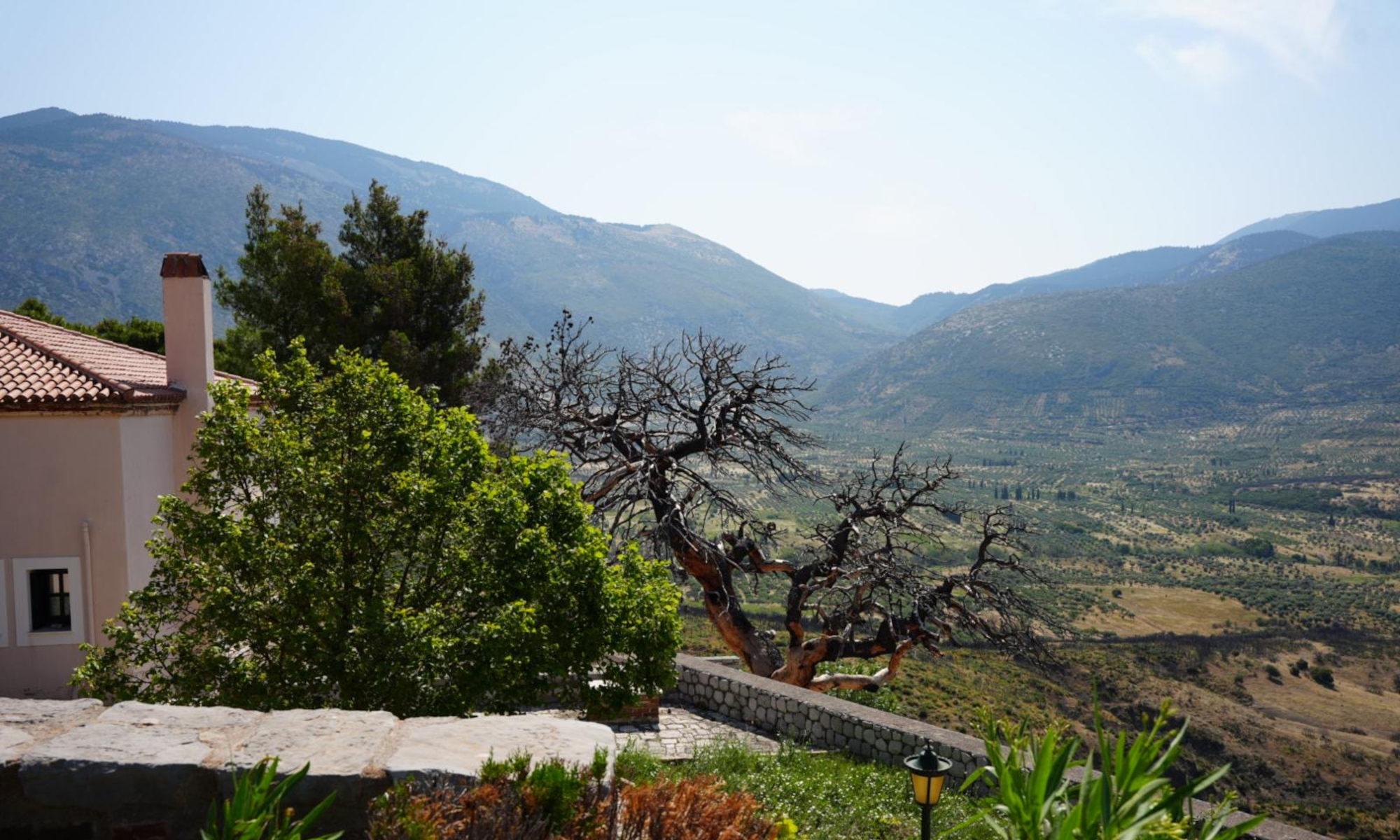by Annalisa Jenkins
A bulwark between the city and the mountain, The Volunteer Forest Protection and Firefighting Team of Ilioupoli is at the end of the road, literally on the frontline of climate change. As unprecedented heat and drought bring intensifying wildfires to Greece, the volunteers of Ilioupoli struggle to protect their forest under the command of a government that volunteers say doesn’t prioritize the preservation of unbuilt environments.
The Hellenic Fire Service, volunteer firefighter Maria Arva said, has three tiers of importance: human lives; then property; and finally nature. She agrees that human lives must be protected first, but gets frustrated when people build homes in fire-prone forests, and expect them to be prioritized over the nature that drew them there. For Arva, “You have to save lives. You have to save priority properties. But the forest is the most important for us.”
As wildfires intensify around the country, Greek fire response has focused on fire suppression rather than prevention. Faced with growing, harder to extinguish fires and the destruction of their land, some underfunded but dedicated volunteer firefighters like Arva have taken the work of wildfire prevention into their own hands.
The Greek branch of the World Wildlife Fund insists that a transition to fire prevention is essential. “We need to do things and activities in the forest to prepare them for summer, in order for them to be more resilient,” Panagiota Maragou, the Head of Conservation at the World Wildlife Fund Greece said. The chapter recently prepared a legislative proposal to use prescribed burns as a tool for fire prevention.
Cutting off low-hanging branches of trees and removing dead wood and underbrush would make forests less flammable, Arva said, making for easier wildfire seasons. The only problem is that it’s illegal.
By doing so anyway, the Ilioupoli team helped save the area in a 2015 wildfire, Arva said; flames didn’t reach the branches of the trees and, though they charred, they didn’t ignite, stopping further spread.
“We look at the mountain and see nothing but black,” volunteer firefighter Maria Arva said last week, with Athens’ Mount Hymettus looming behind her. The station was formed after a 1998 fire devastated the mountain, killing four. The 2015 fire was the second to rip down the same path. Blackened remains of pine trees still dot the hillside.
Arva is a journalist at the Greek TV station ANT1, but each summer, from May 1st to October 31st, she spends her free time fighting wildfires. The firehouse is a small wooden cabin with plump couches, a large television, and children’s art decorating the walls. Off the main living room is a radio system and several monitors, one showing footage from a nearby watchtower. Two white storage containers covered in graffiti stand outside, one with bunk-beds for late shifts, and one with personal equipment.
There isn’t a parking lot at the station; its two municipality-owned fire engines park at the end of the road. This is the first summer the trucks will live there full-time. Until this year, volunteers picked them up from the local Hellenic Fire Station each morning when the station opened, and dropped them back off at night. The team doesn’t have enough committed volunteers to staff the station all day, or all year.
Because the team doesn’t own their trucks, they can’t repair them, and Arva says that the municipality doesn’t treat them well. “They didn’t care for them, and practically they didn’t care about our lives being in that car.” The station’s main engine is from 1992, and each year of wear is evident in its dull exterior. Besides the trucks, the station otherwise relies entirely on donations for equipment.
Arva says the mountain cannot survive another fire. Pine trees don’t spread fertile seeds until they are twelve to fifteen years old, she said, and the regrowth from the 2015 fire is not yet mature enough to reproduce. “We will do whatever it takes not to be burned again,” Arva said. “It’s you do it” or the mountain is “destroyed forever.”
Dry Wells: Farming in the Cyclades Amid Drought and Overtourism
By Annalisa Jenkins
On a hot June morning, Stelios Vathrakokoilis leaned against the bed of his pickup and looked out over the cracked fields on the Cycladic island of Naxos where he and his brother grow potatoes. He gestured over his shoulder and sighed.
“Fifteen days from now, this well will be completely dry,” he said. When the water runs out, he will be forced to irrigate with salty groundwater.
Having grown up in the 1970s and 80s, Vathrakokoilis remembers farmers making a good
living. Naxos potato seeds, known for the unique flavor from the island’s low-calcium soil, were coveted around the country.
Since the mid-90s, however, climate change has parched the island and over-tourism has poached agricultural land, workers, and water. A few decades ago, Naxos produced over 20,000 tons of potatoes each year, Dimitrios Kapounis, President of the island’s farming association, said. This year, he hopes it will produce three.
In 2024, drought left the island’s reservoir empty and the island’s hotels over-pumped their wells, leaving Vathrakokoilis’ dry. That year, he said he “didn’t plant a thing, absolutely nothing, because of the lack of water.” Vathrakokoilis’ work is threatened by climate change, which parches the island; over-tourism, which poaches agricultural land, workers, and water; and a culture that devalues farming.
Vathrakokoilis says the government has yet to fulfill its promise to put water meters on Naxos; there is no tool to measure or regulate how much the ever-growing number of hotels pull—the hot tub on one hotel room’s private balcony looks out over a large pool.
Over the past several decades, the island’s economy has become dependent on tourism: “if hotels don’t work in the summer, the farmers don’t work in the winter,” Irene Lianou, Reservation Manager at hotel Lianos Village, said.
“Tourists are fine,” Vathrakokoilis said, “we all profit from that.” But he needs the island to find a way to share dwindling water resources.
He has some ideas. If he had the money, Vathrakokoilis would install a water-efficient drip system to irrigate each plant directly rather than sprinkling the whole field. Since 2017, he has advocated for a waste-water system that would re-use millions of cubic meters of grey water for agriculture rather than dumping it in the ocean, bringing in water more cost-effectively than a desalination plant.
The project has seen little progress over the last eight years. Vathrakokoilis is frustrated by the country’s politics, which he thinks are more wrapped up in partisan infighting than passing policies that will help people. “This is crazy, we’re losing so much water,” he said.
Eleni Myrivili, who served as Athens’ Chief Resilience Officer from 2014 to 2019, agrees the Greek government could do more to address the problem. “I swear to you, nobody in the central government, and nobody in city government was talking about climate change,” she said in a recent interview of her time in the Athens office.
Now working for the UN, Myrivili says that globally, climate efforts are focused on mitigation, not the kind of acute adaptation projects that Vahtrakokoilis needs to keep his farm alive. He feels forgotten, that “no one cares for agriculture.”
Paros’ mayor, Kostas Bizas, who campaigned on regulating tourism, spoke of food production with resignation, suggesting an inevitable decline. While the government could subsidize equipment modernization, he says the fate of farmers is in the hands of local society, where they cannot compete with the prices of imported goods.
As the effects of climate change worsen and adaptation policies become increasingly necessary, Greece must decide if it will invest in climate adaptation for Cycladic farmers. Eleni Myrivili grapples with how lawmakers ought to decide what is worth saving, scoffing at new housing developments in Boston and Miami flood zones.
While not optimistic about agriculture’s future on his island, Mayor Bizas worries about tourism becoming its only industry; “You cannot totally rely on tourism, because it comes and it goes,” Mayor Bizas warns. Katarina Moschu worries that the boom of tourism will end, and that “the locals will have sold out their island and will be left with nothing.”
If his government does not invest to help him adapt to climate change, Vathrakokoilis is sure about one thing. “In a few years, there will be no agricultural production on the island.”
Hosios Loukas, Distomo and Delphi: Where the Past Still Burns
by Annalisa Jenkins
The pathway into the Hosios Loukas monastery is lined with the blackened skeletons of pine trees. They are remnants of a 2023 wildfire that breached the outer walls of the monastery, forced an evacuation, and came within inches of lighting the church aflame.

The trees stand in memoriam of what the monastery shopkeeper Yannis Loukas calls “one of the worst days in the life of this monastery.” The fire incinerated the monastery’s potato fields and hospitalized a monk who didn’t evacuate.
But it was the vibrance below the burnt trees that drew my attention. In the two years since the fire, wild grasses and pink and white flowers have covered the dry ground lining the path: a pop of color amongst ashy yellows and browns.


Over the two days of our trip into the mountains of central Greece—in the monastery; among the ruins of Delphi; and at the site of a Nazi massacre in Distomo—the line between the past and the present blurs. Within a busy corridor of tourism, each of our hosts is grappling with how to honor their history in the face of great transition.
Father Anthimos, a monk who recently moved to Hosios Loukas, expressed mixed feelings about his reassignment. He came from Mount Athos, a traditional monastery that is closed to all but a few invited male visitors. There, he felt he was living a thousand years in the past. Our guide Sophia Theona explained that monasteries like Hosios Loukas, which invite tourists, are “not usually where a monk wants to be because they have to act as hosts, which was not their calling.”
Hosios Loukas has preserved some of the monastic antiquity that Father Anthimos described. Its thick stone walls block the view of the road leading into it and muffle any sounds of traffic. The soft chirping of cicadas and birds, trickling mountain spring and well-maintained gardens create a bucolic peace. Gold embossed iconography lines the walls of the church and monks wear long black robes, a uniform that has remained unchanged for centuries.
Within this image of the Byzantine empire, however, there are clear reminders of touristic modernity. A large black speaker is tucked into a windowsill beneath a painted bible scene; a small shop off the courtyard sells visitors honey and bars of nougat; signs in English hang on the stall door of a bathroom for women (who historically would not have been allowed into the monastery); a blonde toddler cries to her parents. Tourists hoping to learn about this Byzantine church have, inherently, changed its presence.
After leaving the monastery, we drove to nearby Distomo, where, in 1944 the Nazis massacred 228 of the town’s 1600 residents. Amalia Papaioannou, head of the Distomo massacre museum and granddaughter of survivors, described how she feels a deep “duty to preserve the memory” of the tragedy. Growing up in the 1970s, Papaiannou was surrounded by stories of the massacre—“it’s not just a memory, this story being passed down has formed an identity,” she said. As the last generation of survivors passes away, her biggest fear is that this memory and identity will die with them. It seemed that for Papaioannou, our presence helped to keep the story alive—she thanked us deeply for listening.
How do we honor memory while continuing to heal and live in the present? In the documentary we watched, one survivor, speaking nearly 60 years after the tragedy, lamented that “Distomo still hasn’t recovered. It still hasn’t recovered the peace and colours I remembered.” Is it possible to recover peace when, as Papaioannou said, her community’s identity is formed by a tragic memory?
For each place our class played a different role—an opportunity for the preservation of history or the very thing against which they needed to preserve. Each stands on the precipice of a great transition.
The Hosios Loukas fire was the first that Yannis Loukas had seen in decades working at the monastery. As climate change brings intensifying heat and drought to Greece, it is likely that more will follow.
Lexikopoleio: A “Place that Travels You”
by Annalisa Jenkins
Diamantis Diamantidis says he works at “a crossroads.”
Lexikopoleio, the bookstore where he serves as events coordinator, sells books in Greek, English and French, and attracts visitors from all over. Our first week in Athens, Vivien, Noah and I walked into Lexikopoleio hoping to buy a notebook and were surprised to hear boisterous English from the corner. It was Wednesday—we had stumbled upon the English book club.
Clocking us as English-speakers, Diamantidis waved us over to join, unrelenting even as we explained that none of us had heard of the book. We listened for 45 minutes as they discussed Perfection, a novella by Italian author Vincenzo Latronico that follows a couple of digital nomads as they make a life in Berlin.
It was a fitting choice. The group—Greek locals and expats from the US, Ireland, Argentina and the Netherlands—discussed what it meant to live and work abroad. We couldn’t help glancing at each other as they criticized the couple for their role in Berlin’s gentrification and for not learning German. Very few had themselves learned Greek (and neither had we).
Since just before the COVID-19 pandemic, Diamantidis—who grew up in Pangrati—has noticed expats flocking to the neighborhood. The Greek government is working to attract wealthy foreigners as the Greek birth rate drops. With Greece’s aging population, “even with zero unemployment, only 45 percent of the population [could] earn money and pay taxes and social security contributions,” Greek journalist John Psaropoulos wrote in a February article for his substack Hellenica.
Greece has implemented a number of programs to bring in foreigners, including tax incentives for retirees who pledge to invest large sums and a “Digital Nomad Visa.” The Digital Nomad Visa allows remote workers to stay in Greece for up to a year, with the possibility of annual renewal. It is “ideal if you’re not ready for a long-term commitment but want to explore Greek culture and lifestyle,” an article on the government “workfromgreece.gr” website says.
The front page of the same government website, reading like an ad, asks blatantly, “How can we tempt you?”
 (photo credit: workfromgreece.gr)
(photo credit: workfromgreece.gr)
These incentives for short-term residents come as Greece faces a housing crisis. According to a 2024 OECD report, from 2017-2024, housing costs rose by 69%. Greeks spend more on housing—an average of 35% of their income—than anywhere else in Europe, the Greek Analyst wrote in a recent substack article.
This increase is due, in part, “to the increasing share of non-resident buyers in the Greek real estate market,” the OECD report said. More than 70% of AirBnB listings in central Athens are owned by hosts with two or more listings—people are making a business of buying up homes and renting them out at high prices to tourists and short-term residents, the Greek Analyst said.
The “Airbnbification of Athens” can become “a socio-economic nightmare for people priced out of their old neighborhoods,” the Greek Analyst wrote.
At the book club, when an American asked the group what would happen when they (the expats) were priced out of Athens with the next round of transplants—as had happened to the characters in Berlin—a Greek member of the group laughed sardonically and responded, “ask the Athenians.”
Exploring this pull for Western implants felt particularly dissonant as we spent class time learning about the ultra-right wing Greek Migration Ministry’s quest to shut Greece’s borders to migrants.
Around Pangrati, graffiti decries this dichotomy.

(photo credit: Vivien Wong)
 (photo credit: Noah Labelle)
(photo credit: Noah Labelle)
Like Lexikopoleio, Greece itself is a crossroads situated between the East, whose Ottoman influence it tries to forget and whose migrants it rejects, and the West into which it has integrated.
But Diamantidis is proud of the international community that he has helped to cultivate. Lexikopoleio is a place that “travels you—through the books” and “with the conversations,” he said, sitting in a small nook surrounded by shelves.
Annalisa Jenkins

Annalisa Jenkins is a Sophomore Spanish major from Baltimore, Maryland. She is pursuing minors in Journalism, Latin American Studies and Statistics, with a focus on migration and environmental movements. She has previously reported on the exploitation of immigrants in the workforce and in the housing system and is working on an ongoing project on environmental sovereignty movements in Bolivia, Puerto Rico and Baltimore. In Greece, she is particularly interested in exploring climate migration and the Greek housing crisis.
Recent Works:
Lexikopoleio: Place that Travels You
The Identity of Memory: Honoring History in the Face of Change
Dry Wells: Farming in the Cyclades Amid Drought and Overtourism
